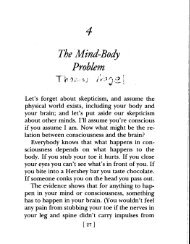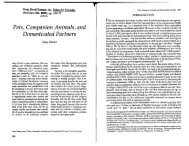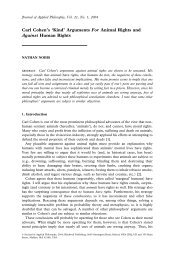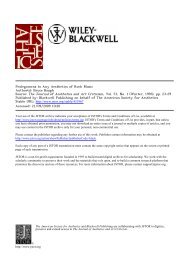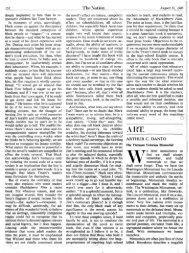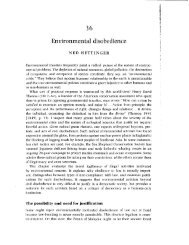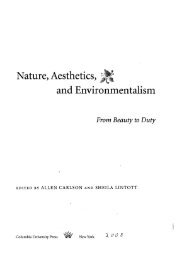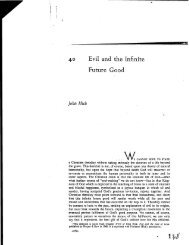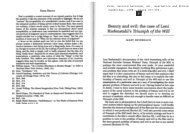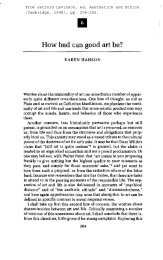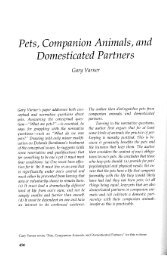Anthropocentrism vs. Nonanthropocentrism: Why Should We Care?
Anthropocentrism vs. Nonanthropocentrism: Why Should We Care?
Anthropocentrism vs. Nonanthropocentrism: Why Should We Care?
You also want an ePaper? Increase the reach of your titles
YUMPU automatically turns print PDFs into web optimized ePapers that Google loves.
ANTHROPOCENTRISM VS. NONANTHROPOCENTRISM<br />
171<br />
to claim that nature has intrinsic value. One could deny anthropocentrism but<br />
claim that the value of every organism depends on the contribution it makes<br />
to the health of its ecosystem; one could deny anthropocentrism but claim that<br />
the value of every nonconscious being depends on whether conscious beings<br />
happen to care about it; one could deny anthropocentrism and claim that there<br />
is no such thing as intrinsic value at all; and so on. 6 <strong>Nonanthropocentrism</strong>, as<br />
defined above, denies that the centre of moral concern should be human interests,<br />
but this leaves it open whether the centre should be something else, or whether<br />
we should think there is a centre at all. While these are interesting questions,<br />
and while it could turn out that the best alternative theory is one that attributes<br />
intrinsic value to the natural world, the aim of the current paper is not to construct<br />
or defend a particular alternative theory, but rather to argue that adopting<br />
anthropocentrism would bring with it a significant cost. 7<br />
With this understanding of the concepts in mind, it may be useful to say<br />
something about what participants believe to be at stake in this debate. Proponents<br />
of nonanthropocentrism often claim that it is precisely the view that ʻitʼs<br />
really all about usʼ that got us into all of these environmental messes in the first<br />
place. In order to solve our environmental problems and avoid running into<br />
them again in the future, they claim, ethics needs to recognise the folly of such<br />
self-centeredness and develop an ethic of, as Tom Regan puts it, respect for<br />
nature rather than mere use of nature. 8 Other nonanthropocentrists claim that the<br />
wrong-headedness of anthropocentrism is evident once we take seriously what<br />
ecology has taught us about our relationship to the rest of the natural world. The<br />
more we understand about how the world works, they argue, the more evident it<br />
is that we are but one species among many, that we live interdependently with<br />
other parts of the natural world, and that we arenʼt as different from the rest of<br />
nature as we once might have thought. Getting clear about our ecological place<br />
in the world is humbling, and the claim is that this humility ought to carry over<br />
to claims about our moral place in the world. 9<br />
On the other side, anthropocentrists claim that insofar as environmental<br />
problems are due to ethical wrong-headedness, the mistake weʼve made isnʼt in<br />
thinking that only human interests matter directly, but rather in being ill-informed<br />
and short-sighted about what our interests really are. If we take seriously the<br />
interests of future generations of humans and get clear about all of the ways in<br />
which the health of the natural environment improves the quality of human lives,<br />
we will have all the arguments weʼd ever need to justify caring about the health<br />
of the environment, behaving in ways that are environmentally responsible, and<br />
adopting policies that are environmentally sustainable. 10<br />
Furthermore, anthropocentrists claim, anthropocentric approaches have a<br />
number of advantages over nonanthropocentric approaches. First, there are worries<br />
about whether nonanthropocentric ethics can be made philosophically viable.<br />
Though I wonʼt rehearse these debates here, the most well-known versions of<br />
nonanthropocentrism have been charged with metaphysical, epistemological,<br />
Environmental Values 16.1






